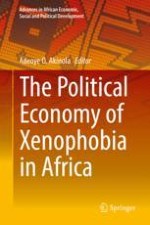2018 | OriginalPaper | Chapter
12. Zimbabwe and the Quest for Development: Rethinking the Xeno-Ethnophobia Tint and the Land Reform Question
Authors : Lukong Stella Shulika, Stella Chewe Sabi
Published in: The Political Economy of Xenophobia in Africa
Publisher: Springer International Publishing
Activate our intelligent search to find suitable subject content or patents.
Select sections of text to find matching patents with Artificial Intelligence. powered by
Select sections of text to find additional relevant content using AI-assisted search. powered by
